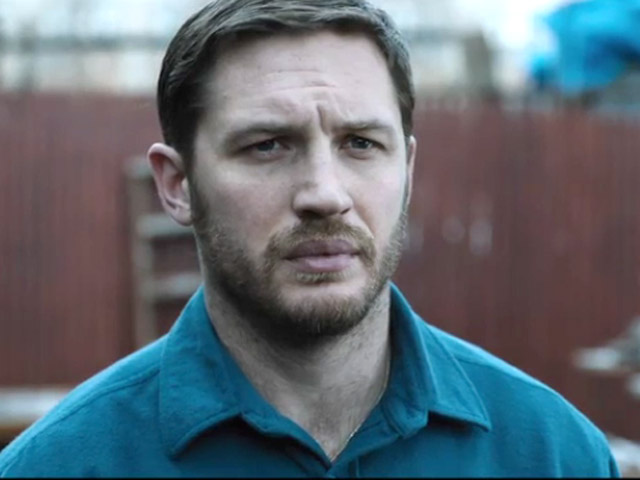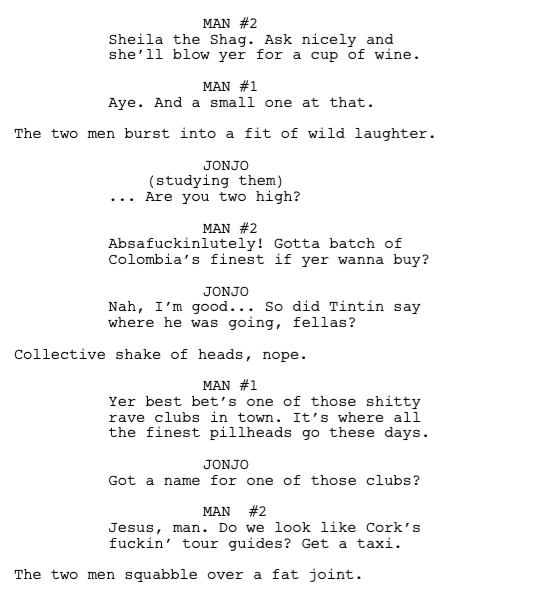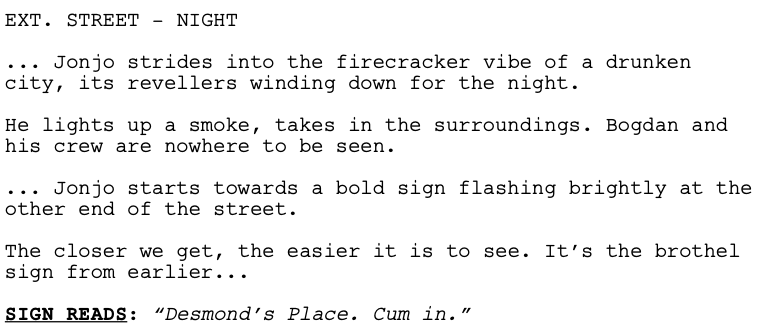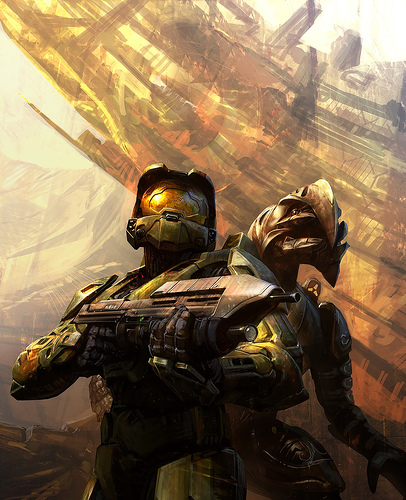Genre: Horror
Premise: The son of an infamous serial killer goes on the road with the daughter of one of the victims to find and stop his father.
About: Today’s spec made The Blood List (the annual list of the scariest screenplays) in 2012 and resulted in the writer, an unknown, getting the job to write the new Texas Chainsaw Massacre film, Leatherface.
Writer: Seth Sherwood
Details: 105 pages
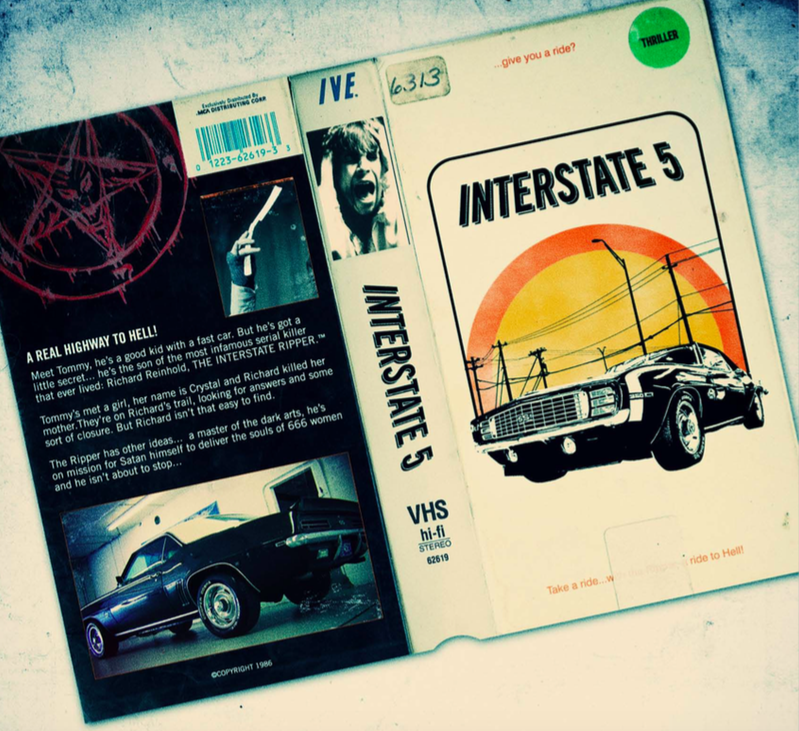 Interstate 5’s cool title page!
Interstate 5’s cool title page!
It’s Halloweeeeeeeeeeeeen!
Well, it’s almost Halloween anyway.
Actually, it’s still 11 days until Halloween.
But that’s not going to stop us from enjoying the most unnecessary holiday of the year, right? Carson! How could you call Halloween unnecessary?? Well let’s think about this for a second. This is a holiday… ABOUT SCARING PEOPLE. Does that make sense to you?
We’ve got holidays celebrating the birth of Jesus Christ. We’ve got holidays celebrating the birth of a nation. Those holidays feel like there are some actual stakes attached to them, to use a screenwriting phrase. Halloween? It’s like a bunch of dope-smoking teens got together and came up with a joke holiday. “Yo man, they should create a holiday for scaring people.” “Yeah man, and like, you should get candy and shit.”
Hey, I’m not complaining. I still have half my stash of single package Reeses peanut butter cups from 5th grade and I plan to ration those puppies out for another seven years at least. Love me some Resses. But it is one of the stranger curiosities of the American calendar.
Although that’s not the reason I picked Interstate 5 for a Scriptshadow review. It’s important for you guys to know what’s required of a script to get an unknown screenwriter (you) that all-important “big assignment.” Sherwood was just another guy trying to break through the Hollywood gates before he wrote this. Now he’s writing a major horror property. That’s a big deal. Not just for the assignment itself. But once you write on a major property, the rest of the industry takes you seriously. So let’s see what was so special about Interstate 5.
The year is 1985. Noted serial killer Richard Reinhold, who was once captured and thrown in prison, escaped eight years ago, and he’s just started killing again. His victims of choice, like most serial killers, are young women. He picks them up along the highway, rapes them, and carves them like a pumpkin.
But this story isn’t about Richard. It’s about Tommy, a 20-something who was unfortunate enough to be born Richard’s son. Tommy’s life has been a nightmare ever since his father was captured, and now he wants to find some closure. He wants to find his father and kill him.
Tommy is joined by Crystal, whose mother was one of Richard’s victims. The two, armed with Richard’s diary, which details every woman he killed and every place that he stopped at, head down Richard’s famous stomping grounds, Interstate 5, trying to catch up to his killing spree.
Tommy also uses a lot of drugs to cope with his shitty reality. Stress and drugs tend not to mix, so everywhere they stop, Tommy’s convinced he sees the ghosts of the dead victims. Crystal, who was very much pro-Tommy at first, starts to freak out about this, cause she isn’t seeing what he’s seeing.
As they get closer and closer to catching his father, Crystal starts to suspect that Tommy’s losing it. That Tommy may, in fact, be BECOMING his father. The reality, however, is much worse than Crystal could ever imagine. The truth is far far worse.
 More Halloween scripts coming your way!
More Halloween scripts coming your way!
So what makes a good horror movie? Scares? Blood? Scantily clad women running through the forest at night? I’m sure we could have a lively debate about the answer, but I’ll say this. I was watching my favorite show last night, The Walking Dead, a show that has somehow GROWN its audience with every successive season, and I asked myself, “Why do myself and others like this so much?”
The answer came pretty early on. What The Walking Dead does better than any other horror show (or movie), is that it provides a constant impending sense of doom. In last night’s episode, our group runs into a priest. The priest seems feeble, a coward if there ever was one. But the longer the episode goes on, the more suspicious we become of this man. Is he really just a priest? Is he really out here all by himself? What is he hiding? We’re not sure, but we think it’s something. And that makes us worried for our characters, which is why we keep watching. We want to make sure they’re going to be okay.
There are parallels in Interstate 5. I have to admit that the first half of the script was a little bland. They’re basically just looking for his dad. Nothing surprising happens. I’d venture to say there wasn’t a single unexpected moment in the first half (you guys know how this drives me crazy – never give your audience what they expect. Find out what they expect and use that against them).
But then the script does introduce a twist, and it’s a pretty good one (spoilers). It turns out Crystal is working with the police. This whole story she’s concocted about Richard killing her mom is a façade so she can use Tommy to find Richard.
Not only does this introduce dramatic irony (we know Crystal’s a cop, but Tommy doesn’t) but it’s the beginning of Interstate 5’s “impending sense of doom.” Tommy’s starting to lose it. He’s starting to see more of these “ghosts.” He’s starting to feel the memories of his father invade him, change him. We begin to realize that Tommy is not as innocent as he seems. He may have those same genetic psychopathic tendencies, which means that Crystal is in danger. The further they go, the more convinced we become that he’s going to do something to her. Just like The Walking Dead. We stick around to see if she’s going to be okay.
But here’s where things get a little tricky. This “impending sense of doom” device only works IF YOU CARE about the character’s safety. With The Walking Dead, we’ve known those characters for 4 seasons. We’ve developed a connection with them. So of course we’re going to care about their safety.
In Interstate 5, I barely knew Crystal. Beyond her having a dead mom (which didn’t even turn out to be true), I’m not sure I knew one unique thing about her. And this is why feature writing is so hard. You have 1/50th of the space (compared to TV) to create a memorable character the audience cares about. Crystal wasn’t a bad character by any means. But I didn’t LOVE her. And I think the audience has to love a character to care whether they get hurt or not.
Despite that, I think Sherwood did a good job delving into Tommy’s character. Just by being the son of a serial killer and all the baggage that comes with that, you’ve got somebody pretty complex. Add to that a pill addiction, visions, flashbacks to happy times between him and his father, and the demons he’s fighting inside when dealing with Crystal, and this is a pretty strong character exploration.
I think that’s what the producers of Leatherface saw in this. They saw an attempt to explore a character as opposed to another boring jump-scare flick or another boring gore-focused flick. Anybody can write jump scares and gore. Literally, a second grader can write, “And then he stabs her over and over again.” Not that I’d want my kid hanging out with that second grader. But the point is, it’s easy. It takes a lot more skill to explore a character. It shows the producer that you’re willing to look into WHY the character became the way he did. And when you do that, you tend to create more interesting characters.
So why didn’t that happen with Crystal? I’ll get to that in the “What I learned” section. But right now, I’ll just say Interstate 5 is a solid worth-the-read. It was teetering between a “wasn’t for me” and “worth the read” for awhile, but I have to admit, its little twist ending there (a total, “How the heck didn’t I see that coming???” moment) solidified it as a script worthy of your attention.
[ ] what the hell did I just read?
[ ] wasn’t for me
[x] worth the read
[ ] impressive
[ ] genius
What I learned: Remember, when you create “fake” characters, it’s harder to explore them on a real level. One of the reasons I never connected with Crystal was because Crystal’s character was a lie. She wasn’t who she said she was for half the movie. When you’re writing that kind of character, you can’t have the character talk about their REAL life, their REAL experiences, because to do so would give up who they secretly were. So the reader’s only going to get a shell of who the character is. False characters are great for twists, but they provide a challenge on the character development front. So make sure to weigh the risks versus the rewards when you write this kind of character.
Get Your Script Reviewed On Scriptshadow!: To submit your script for an Amateur Review, send in a PDF of your script, along with the title, genre, logline, and finally, something interesting about yourself and/or your script that you’d like us to post along with the script if reviewed. Use my submission address please: Carsonreeves3@gmail.com. Remember that your script will be posted. If you’re nervous about the effects of a bad review, feel free to use an alias name and/or title. It’s a good idea to resubmit every couple of weeks so your submission stays near the top.
Genre: Crime-Thriller
Premise (from writer): Over the course of one night, a reformed father must step back into his murky past to find his criminal brother who is the only suitable donor for his dying son…
Why You Should Read (from writer): I think it was Tarantino that said he’d been staring through the window at the industry for so long prior to Reservoir Dogs’ success that it felt normal for him to be on the outside now. At times I very much feel the same. I’ve had the agents, the managers, the lawyers and done the water bottle tour too. I’ve had scripts go out to all the major studios and prod cos and placed highly or won most of the major contests worth entering. I’ve written/directed my own award winning short films that allowed me to go around the world to various festivals and meet audiences first hand, and I’ve had pilots go into networks and yet I’m still here bashing away, whilst staring through that looking glass and working as a bartender. So, I decided to take stock, go away and write something that I’d want to see at the cinema. A movie me and my buddies would find cool. It’s taken me 13 feature scripts and 4 pilots to “find my voice” and I’m keen to show it to a script writing community that’s as passionate about writing great stories as I am. This is REBEL CITY – with echoes of Michael Mann’s Thief and The Friends of Eddie Coyle – it’s a neo noir crime flick… Hope you like it as much as I enjoyed writing it.
Writer: Chris Ryden
Details: 114 pages
Man, I hadn’t read the “Why You Should Read” until just now. That shows how hard this business is. Chris has already made a ton of headway in his career, and yet he’s still, as he points out, “bashing away.”
After reading Rebel City, I know why he’s made it as far as he has. Chris can fucking write. Not only does he have all the technical stuff down (very sparse description, clean easy-to-read writing, characters that pop off the page as soon as they’re introduced, gets to the point quickly in scenes) but this just feels like a movie when you read it.
One of the things I love, as a reader, is when I go into something with expectations, and those expectations are immediately turned on their head. Like when I see “Crime” as the genre, 9 out of 10 times I know we’re going to start in some restaurant (or bar, or club) with a bunch of “tough guys” (cops or thugs) talking “tough guy speak.” The restaurant will always be over-described, giving the first page wall-of-text ebola. We’ll then listen in on the tough-guy speak, only to realize by the second page that there’s no point to the scene other than for the writer to be able to write this dialogue – dialogue, mind you, that is 95% clichéd.
In Rebel City, we start with a black screen and a phone call. The discussion is quick and to the point. “Where the fuck are you, Seamus?” “Your flight landed four hours ago.” “Wasn’t on it.” “I didn’t hear that.” “I’ll come get you.”
Not only do we start unexpectedly. But we start with PURPOSE. The words coming out of the characters’ mouths actually MEAN something. A story is being presented. In the very first scene! That’s how you catch a reader’s attention.
And that’s how Rebel City opens. Jonjo, a former criminal who used to live in the small dirty city of Cork, has to go back there to pick up his derelict brother, Seamus. You see, Jonjo’s 7 year old son is dying. Seamus is the only kidney match for him. But Seamus is a wreck. He’s already missed half a dozen plane flights back here with various excuses, and somehow Jonjo knows that if he doesn’t get him now, he might never get him.
So back to Cork Jonjo flies, thinking he’ll just show up at his old house and there Seamus will be. Except it’s never that easy with Seamus. Instead of his brother, Jonjo runs into three thugs who rough him up, telling him he needs to give Seamus a message. They want Florenta back, whoever the fuck that is.
Jonjo then heads to his sister’s place, who he hasn’t seen in years, and she wants nothing to do with him ON TOP of not knowing where Seamus is. Jonjo realizes that if he’s going to find Seamus, he’s going to have to go back inside the grisly underworld he worked so hard to escape. He’s going to have to be Bad Jonjo again.
So then, in the spirit of The Equalizer and John Wick (“That dog was a dying gift from my wife!”), that’s exactly where Jonjo heads. He meets some old friends and makes some new ones (if “making new friends” includes being shot at, tied up, and tortured). The longer he looks for Seamus, the more he realizes his brother’s involved in some deep shit, the kind of shit where even if he finds him, there’s no guarantee they’re going to get out of this town alive. But Jonjo’s son takes precedence over everything. If there’s any chance of getting his brother, he’s going to take it.
It’s hard to read Rebel City and not marvel at the skill on display here, particularly the dialogue, which is something we don’t get to celebrate enough on the site. Chris keeps his dialogue short and to the point so it zings by, knows his characters well enough that each one sounds a little different, and gives each line a touch of salad dressing to elevate it above regular conversation.
And his description isn’t too shabby either. Chris never lingers, never over-describes, but adds just enough flavor to paint a picture.
You’re probably sensing from my tone that there’s a “but” coming. And there is. But there’s something that didn’t click here for me. And this is one of the most frustrating parts of my job. It’s kind of like being a music producer. You have a singer come in and they have an AMAZING voice. It fucking blows you away. Then later you pop in a song of theirs and the song is ho-hum. You still hear that amazing voice, but the song isn’t doing it for you.
I think my reservations are due, in part, to me hoping the script would go in another direction. I thought Jonjo was going to pick up the world’s shittiest brother, Seamus, and the two would have to navigate themselves out of the town. Cause to me, Seamus was the most interesting character in the screenplay. He’s this piece of shit who has the opportunity to save his own nephew, and yet he can’t fucking get on a plane with a ticket already bought and paid for. I wanted to know more about what made that guy tick. And I wanted to see that sibling relationship play out over the course of the movie.
But after 20 pages, I realized that Seamus was a plot device only. He exists only to get Jonjo there, which means Jonjo’s going to be doing this alone. And don’t get me wrong. There are still some nice moments. Hell, I think the Peg-Leg Pete Dominatrix scene (page 65 for those who want to jump straight to it) should go down in the annals of Amateur Friday history. That was some fun/hilarious/disturbing shit.
But a lot of the other conversations and scenes felt too familiar. Just like those singers who can knock a high note out of the park, Chris had a stranglehold on these characters and they all sounded wonderful. Still, the song wasn’t making me dance. If you’ve asked one low-rent punk where Seamus is, you’ve asked them all.
So if I were Chris, I’d embrace the absurdity of this world. Just like the Peg Leg Pete scene and, to a lesser extent, the Evelyn scene (I feel like we cut out of that scene before things could get good), you make this a cast of characters that are over-the-top and fucking weird. Each one moreso than the last. The further this journey goes on, the stranger it gets. Because, yeah, the Cunninghams were okay as a gang, but they were far from MEMORABLE. I want memorable.
Also, and keep in mind this is coming from a sci-fi geek, I thought the mystery government high-tech box thing should have played a much bigger part in the story. That was the first moment where I went, “Whoa, what the hell is Seamus involved in here?” There was finally some real mystery to the story. But as soon as it’s mentioned, it goes back into hibernation. I would’ve loved for that to arrive earlier and be a bigger part of the plot.
The way I see this is we’ve already seen the standard version of this movie. The thug underbelly English/Irish life. So what are you going to do to make your “thug underbelly English/Irish life movie” different? How do you make yours stand out? I say you do it by putting more crazy into these characters. I understand this changes the tone of the movie significantly, and if that’s not the movie you want to write, don’t write it just because I think you should. But that was my problem with the script. It felt too familiar.
Script link: Rebel City
[ ] what the hell did I just read?
[x] wasn’t for me
[ ] worth the read
[ ] impressive
[ ] genius
What I learned: It’s no secret that I believe opening scenes are the most important scenes in the script. They’re the scenes where you either hook the reader or lose them. So here’s a strategy for writing them. Whatever TYPE of movie you’re writing (genre plus concept) ask yourself, what’s the most likely opening scene for that kind of movie. For example, if you’re writing a Western, the most likely opening scene might be a duel in the middle of town. Then, write something COMPLETELY DIFFERENT FROM THAT. Just write something they aren’t expecting. Because if you can defy your reader’s expectations on the VERY FIRST PAGE, they’re going to trust you as a writer. They’re going to believe you can keep doing that over and over again.
In some ways, a script is like a computer game. You’re writing a bunch of code in the hopes of providing the end user with a seamless enjoyable experience. If you get a line of code wrong, you’ll see a small glitch in the game. Get a few lines wrong, the game gets “glitchy.” Get a lot of code wrong and the game becomes unplayable.
How do you fix the game? You troubleshoot. You figure out where the glitch is occurring, what the corresponding lines of code are, and you rewrite them until the glitch goes away. Screenwriting isn’t that different. If the solitary McCall from The Equalizer is singing karaoke, that’s a glitch. All it takes is one reader to note, “That doesn’t match up with how McCall acts for the rest of the screenplay.” This observation helps the writer make a simple fix. He drops the scene where McCall is singing karaoke. Problem solved.
Unfortunately, you don’t always have the advantage of feedback. It’s hard to get friends to read your script and give detailed notes. And forget about someone doing it twice on the same screenplay. They may not say, “I’d rather kill myself than read this a second time” but you can tell by their expressions that that’s exactly what they’re thinking. Therefore, script reads must be saved. They cannot be burned. So in the meantime, you’ll be your own troubleshooting your stuff. But lucky you. I’m here to help.
The first thing you want to do when troubleshooting a draft is to get some distance from it. The more time you can spare (1 month is preferable to 1 week), the better. Essential for good troubleshooting is objectivity. And you can’t have that if you just finished a two month rewrite. It’s impossible for you to see anything objectively at this point.
Once you’ve created enough distance, read your script. Now when you do this, don’t worry about technical things (your sluglines or your description). That’s not what’s important. What’s important with any script is how it makes the reader FEEL. If the reader is swept away by the material – if they’re riveted or excited or sad, these are all good things. What you’re trying to do when you read your script, is act as the reader. You’re gauging how it makes you FEEL.
There is one particular feeling you want to pay attention to above all others: Boredom. Boredom is the biggest baddest enemy to writing. Scripts can survive angry readers. Scripts can survive frustrated readers. But no script can survive a bored reader. So every time you feel bored, write it down. Write down your other feelings as well (anger, happiness, shock), but boredom should take a 10 multiple priority over the other stuff.
Now keep in mind, you’re not a true reader of your script, since you’ve already read it dozens of times yourself. There’s going to be some reader-fatigue every time your read your own stuff, making you an imperfect test subject. But generally speaking, you should trust your feelings. If something feels boring or stupid to you, it’ll probably feel boring or stupid to others.
Once you’ve done this, look through your notes, and find the 4-5 biggest reactions you had. Like if a 20 page chunk was boring, that’s important. If you hated a character, that’s important. If a plot point or a plot twist felt really stupid to you, that’s important. We pick the five biggest reactions because we don’t want to be overwhelmed. You don’t want to try and fix every little thing yet. Besides, when you start fixing the big things, you’ll notice that a lot of the smaller things will correct themselves.
Now here comes the toughest part of troubleshooting. Once you’ve identified that a section of your script is boring, you need to figure out why. And why isn’t always clear. For example, let’s say Frank is writing a Die Hard-like movie that takes place on an oil tanker. Somewhere around the midpoint, Frank realizes that he’s bored with his script. The story is lifeless. What’s wrong?
I might read Frank’s “Die Tanker Die” and notice that at the midpoint, there’s a big four-scene chunk, 10 pages in total, of Frank’s hero, McChucker Doogan, talking about his backstory to his French love interest, Nadine Steauxpede. All four scenes are essentially saying the same thing. McChucker lost his family in a fire and he’s depressed about it. I might then tell Frank to combine all four of those scenes into a single one (or tell him to get rid of them completely). Instantly, the pace picks up, and all of a sudden the midpoint isn’t dragging anymore.
But it’s typically not that easy. Usually, a script issue is due to choices made long before the problematic scene (or sequence) was written. To figure our where the problem originated requires you to be a bit of a detective. And you don’t have to be an expert in screenwriting to crack the case. You just have to be perceptive. So let’s get back to that midpoint of Die Tanker Die. The new scene where we realize we’re bored is when McChucker’s hiding in a cabinet in the mess hall to evade the villain, Crooks Caravelli.
Why are you bored? This should be one of the most exciting scenes in the script! McChucker is inches away from being discovered by Crooks!
Look deeper into the scene. Instead of focusing on your general feeling of boredom, ask yourself, “What specifically is making me bored?” I don’t mean in “screenwriting-speak.” Speak plainly. What’s making you bored? You might realize after awhile that, “You know what? I don’t really like McChucker in this scene.” Okay, now we’re on to something. Just like a good detective, keep asking questions. Why don’t you like McChucker in this scene? Think hard. After a few minutes, you realize that it’s because McChucker’s hiding. But it’s not just that. It’s because so far, that’s all McChucker’s been doing throughout the script – is hiding. Unlike John McClane from Die Hard, who goes out there and actively kills the terrorists, McChucker is a hide-o-holic. He’s an inactive hero. Oh my god, you realize. No wonder I don’t like McChucker. He’s a wimp!
Now you have your first directive on the rewrite – Rewrite McChucker’s character. Make him more active. Make him braver. What’s important to note here, is that the scene where you realized you were bored wasn’t the reason you were bored. You were bored because of choices you made a long time ago – in the design of McChucker’s character.
But let’s say McChucker wasn’t the problem. Heck, McChucker’s your favorite part of the script! What then? Here’s something that might help. Try to locate that exact moment when you became bored. What was the exact scene that did it in for you? Treat it like a murder mystery. Look for the clues to solve the murder.
Say for instance the scene that really did you in was when Crooks Caravelli went on a three page monologue to his cronies about the parallels of their plight to the Greek Gods. Something bothered you about that scene but what was it?? Was the monologue badly written? Not really. Then it hits you. Why does Crooks have so much time to ramble on for three pages??? Shouldn’t he be, you know, enacting his plan?? Aha, you realize. If he’s got all that time, it means he’s not in a hurry. If he’s not in a hurry, then three’s not enough urgency in the story. That’s the problem.
So you go back to the drawing board and you add a plot point where the coast guard is on their way to the oil tanker. They’ll be there in 30 minutes. That’s how long Crooks has to finish his plan. Under this new setup, the writer realizes Crooks doesn’t have time to spout out empty 3-page monologues because he needs every second he’s got to complete his plan. Problem solved.
It’s important to remember that there’s never any ONE WAY to solve a problem. I could look at this same problem and come up with a completely different solution. For example, maybe McChucker sneaks into the bridge when Crooks isn’t there and notices that they’re heading towards a small unidentified body of land, land that shouldn’t be there. Before McChucker can find out more, Crooks comes back, and McChucker has to sneak out. We may not have the urgency of the Coast Guard on our tail in this version, but we now have some good old fashioned suspense driving the story. What’s this mysterious body of land?? Why are they going there??
Keep in mind that extended feelings of boredom (like beyond 20 pages) are indicative of much deeper problems that are usually due to one of three things: concept, structure, or character. If your concept is boring (2 guys fishing on a Sunday afternoon), it’s going to be hard for even the best writers to find 2 hours of drama in it. Make sure you have a concept that’s constantly putting your characters in trouble, is constantly forcing them to act.
If concept’s not a problem and large swaths of script are still boring, check your GSU. Make sure your hero and villain always have a goal, that there are high stakes attached, and that there’s a sense of urgency behind the objective. It’s fine if the goal keeps changing as long as it continues to meet the GSU criteria (every new goal is coupled with stakes and urgency – or the previous stakes and urgency are still in play).
If your structure is fine, ask yourself if your characters are interesting. Do they have compelling personalities? Are they fighting something inside of themselves (a flaw, a vice, good vs. evil). Are they fighting something with another character (can this marriage work, can this broken father-daughter relationship be salvaged, can we win this battle even though we have completely different opinions on how to fight it). Are the characters unique? Are they likable? Are they unpredictable? A lot of times a plot isn’t working because the characters inside that plot are boring as shit.
You’ll find that if you fix the 5 biggest problems in your script, your script will instantly be better. But note that with these new changes come new ideas, new additions to your script. And therefore, after you make the changes, you’ll go right back to the troubleshooting stage again. Figure out the five biggest new problems in your new draft, come up with solutions, and write a new draft. You’ll keep doing this for however long your process is (for some people it’s 5 drafts, for others it’s 20), until you finally feel confident that the script is the best you can make it. Now, my friend, you can send your script out there for the world to see and hope all that hard work paid off. I’m betting it will have.
What about you guys? How do you trouble shoot your scripts?
Genre: Sci-fi
Premise: In the near future, where a secret group of humans have been genetically upgraded, a young girl holds the key to stopping these “synthetics” from taking over the world.
About: This is the new thing I was talking about. A spec script can’t just sell alone. It has to be like the recently sold “The Eden Project,” which is the beginning of a trilogy, the promise of a franchise, something that might even turn into a universe. Christine Hodson is an up-and-coming writer who was a former development exec, and has sold a few scripts now (none have yet made it to the big screen). This is clearly her most ambitious one, and sold for three quarters of a million bucks. It includes another new trend of giving your big expensive action movies female leads.
Writer: Christina Hodson
Details: 117 pages
Talk about a script slump. What was the last feature script I flipped over? Hot Air? When was that? Four months ago?
I’ve been giving a lot of feedback to writers lately, and after giving one writer some particularly harsh (albeit kind) feedback, he asked me if I’d reached a point where nothing was fresh to me anymore. If it didn’t matter what a writer wrote in my eyes, because I’d already seen it a million times due to the sheer volume of scripts I read.
That question has lingered with me since. Could it be true? Might all these scripts and movies I haven’t liked lately actually be due to my unnaturally high read volume? I mean aren’t there only so many ways to tell a story? Am I asking too much by telling writers to give me something new, different, unique and not the same ole same ole?
While there’s no question that reading a lot of scripts dulls the read senses, I came to the conclusion that this answer would be an excuse, and I’ll tell you why. Because while it’s true there are only so many ways to tell a story, there are an infinite number of ways to create characters. No two people on this earth are exactly alike, and the same should be said for the people in screenplays.
If you put that extra effort into birthing a unique character who feels real and complex, and you do the same with all the other characters in your story, then you should be able to write something good, regardless of if the story feels familiar.
I know this because usually, when I don’t like a script, it starts with the characters. Either I don’t connect with them, identify with them, like them, or see anything unique in them. So I may be on page 10 by that point, not even at the doorstep of the actual plot, and I’ve already decided I don’t like the screenplay.
I think this is the skill that truly separates the good from the bad screenwriters. The good not only do the extra work to create these complex individuals, but they find compelling ways to explore the collective of those individuals, how they interact with one another. The writers who hunker down and commit to doing this typically reap the rewards. Let’s hope we get some of that today in The Eden Project.
Laura Walker, your average soccer mom, has a perfect husband, John, and a bright 7 year old daughter, Ruby. She also has a secret. She’s not human. Or at least, not a hundred percent. And when she steps on a plane to Tokyo, she’s well aware that her chances of making it to her destination are small.
Indeed, she’s attacked on the plane by a man with superhuman strength, who then who puts the plane down, killing Laura and the other 200 other people on board.
In the meanwhile, a woman named Eve, who’s like the female version of The Terminator, walks through the desert until she hits Vegas. Eve is looking for Ruby, Laura’s 7 year old daughter (who looks 15 – but we’ll get into that later). Ruby’s been keeping a secret from her father. She and her mom are “synthetics,” advanced next-gen versions of humans.
But it’s a little trickier than that. You see, the real synthetics, who we’ll call the “bad” synthetics, are planning to take over the world. Laura was a synthetic escapee who was developing a virus to kill the bad synthetics. She was on her way to Japan to give the virus to a man who could inject it into the synthetic mainframe. But the synthetics figured it out and stopped her before she could.
Now Eve, a “good” synthetic who was working with Laura, must get Ruby (and her dad), who also has the virus inside of her, to their Japanese contact before the bad synthetics get to them first.
Take 1 part Terminator, mix with 2 parts Matrix, add in a “Lucy” like female lead (actually dual-female leads), and you have a movie that’s able to capitalize on all the elements of those films, while still being its own thing. Put frankly, this is EXACTLY how you sell a spec. Find out what worked before you, do the same, but give it a slightly unique spin.
Conceptually (and by that I mean all the elements that went into making this saleable – like the female lead thing), I give this an A. But execution-wise, it never reaches that lofty bar. And that’s partly because it’s existing within a framework where we already know what happens next. I mean the GSU is here in spades (get to Japan, fate of the world is at stake, bad guys are closing in), which makes for a lean-mean ask-kicking spec machine. But it’s so firmly rooted in the DNA of Matrix and Terminator that it doesn’t take a futurist to predict what will happen next (although I give it props for a daring unexpected late plot development).
And what about that whole character thing I was crooning on about earlier? What about that?
Well, Eve is essentially the Terminator in Terminator 2. She’s all 1s and 0s, no understanding of emotion whatsoever (she coldly offers to kill John for Ruby – Ruby’s like, “What?? He’s my fucking dad.”), and her journey is about learning to feel. So there’s definitely some character development going on, but once again, it’s character development we’ve seen before.
The far more interesting character scenario is John. He finds out that his wife and his kid have been lying to him this whole time. That his whole life has been a lie. How do you handle that kind of fallout? However, the script makes it clear that it’s way more interested in spending time with the girls than the boys, so John’s fascinating little character issue is only grazed.
A couple of other observations I had. Adam, our synthetic baddie, trashes his secret station after taking down Laura’s plane so no evidence is left, but decides to leave Eve there. This us quite the lazy oversight. The only reason Eve appears to be left alive is because the story needed it. It would’ve made a lot more sense to either bring her with or get rid of her. It made zero sense to let her out into the wild.
Also, Ruby (the daughter) is a 7 year old who looks 15. John’s spiel about being tricked by his wife doesn’t hold up if he never noticed that his 7 year old daughter looked like a sophomore in high school. That’s usually Red Flag Numero Uno. More on these two problems in the “What I learned” section.
Finally there were the fights. Which were fun. They had a very “Matrix-y” feel to them. But they were a little “been-there-done-that.” This is something I’m noticing more and more with this “repackaging male-as-female” trend. The writers think changing the gender is all they have to do. All the action beats can be exactly the same.
Except you NEVER want to think that way. No matter whether you’re updating a genre or a gender, you always want to look for ways to take scenes and ideas within the movie to a new level. The reason James Cameron made The Terminator was because he imagined a metallic skeleton chasing a woman and he thought, “I’ve never seen that in a movie before.” That’s always gotta be your bar as well. You need to think up those moments that audiences have never seen before. Especially in the ultra-competitive action genre.
Besides these problems, The Eden Project was an easy read. Rarely does Hodson go over 2 line-paragraphs, which is smart when you’re writing an action script. We’re always on the move, always hurrying to get to that next checkpoint. There’s no breaking new ground here. But there’s enough to make it work and, more importantly, we have a concept that studios will want to turn into a movie.
[ ] what the hell did I just read?
[ ] wasn’t for me
[x] worth the read
[ ] impressive
[ ] genius
What I learned: As writers, one of those great feelings you have is getting your script to the 98% point. That’s where you’ve finished all the heavy-lifting. All the big plot points make sense. All the scenes look good. The character work is strong and seamless. 98% feels damn nice. BUT, 98% is deceiving. You tend to think, “You know what. All the important stuff is finished. Let’s just get this out there.” As a result, you expose your script to the world when it still has mistakes. Here, we have the “Let Eden roam free” oversight along with your father character not being more curious about his 7 year old daughter looking 15. Is it annoying to have to figure out a solution for these things when you can gloss over them in the script with cheat lines like, “I just thought she had a weird disease?” Sure, but getting that final 2% figured out makes a difference. It makes the script whole. True, it didn’t affect The Eden Project’s sale. But I read the hundreds of scripts where the writers didn’t take care of the last 2% (or 5%, or 10%) and those scripts don’t always have the strong conceptual backbone that a script like The Eden Project has. And therefore the 2% becomes a lot more important. So no matter how exhausted you are, get your script to 100%. It’s worth it.
Genre: TV Pilot – Sci-fi Comedy
Premise: In the early 22nd century, when space travel is commonplace, a young ship commander accidentally flies his crew into a parallel dimension.
About: Paul Feig (Bridesmaids, The Heat) is one of the new faces for Yahoo’s recent infatuation with comedy half-hours. Yahoo and Amazon are looking for ways to differentiate themselves from the Netflix original programming dynasty and since Netflix loves its one hour dramas, the two media giants are going after comedy instead. Feig, who started in TV with the universally acclaimed “Freaks and Geeks,” a show that’s spawned every comedic actor working right now who didn’t come out of SNL, is coming back to television with Other Space, a show he originally conceived of ten years ago. That’s the draft I’m going to be reviewing today, the old one. Let’s check it out, yo.
Writer: Paul Feig
Details: 50 pages (but it’s in that old TV format where everything is double-spaced) – 1/12/04 draft
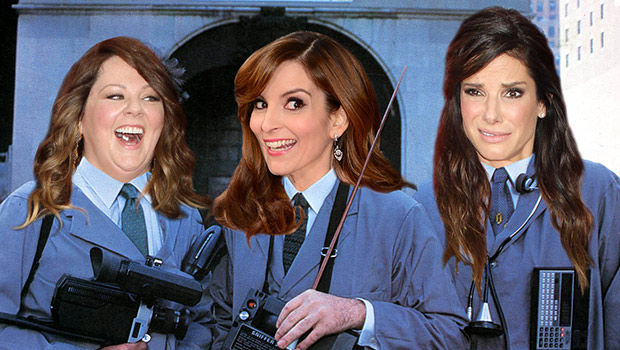 This would probably be the best female Ghosbusters trio
This would probably be the best female Ghosbusters trio
If you’re anything like me, you’re equal parts intrigued, worried, skeptical, and fascinated by this whole “All-Female” Ghostbusters thing Paul Feig is putting together. It has the potential to be really funny or REALLY bad. I mean, if the only reason you have an all female Ghosbusters team is because a director is really good with female actors, might that not be the best way to approach a story?
Isn’t the idea of a storytelling to grow ideas organically? Not because you’re trying to meet some mandate that will allow the movie to get a green light? Then you tack on this whole thing about how the previous Ghostbusters installments never happened, and we’re in hot slime. That’s a very curious position to take. You’re erasing from the archives some of the most lovable characters in cinema history. Is your core audience really going to be okay with that?
And how do you even begin to explain an all-female Ghostubsters team in a script? Are they going to have a sign on the front door that says, “Female applicants only?” What would be the logic in eliminating males from becoming Ghostbusters? I suppose you can write it in that the three main characters are friends from graduate school, just like the original Ghostbusters, but this setup is already feeling a mite forced.
I wouldn’t be surprised if, at some point, Feig said, “Uhhh, nothing about this feels natural,” and they ditch it again. Why does this project have to be so complicated? Make it so that, since 1989, the old Ghostbusters cleaned up the ghost problem in New York so that nobody’s seen a ghost in 25 years. But recently, a couple have been spotted, and some new Ghostbusters bring the old business back to life? People aren’t clamoring for a world-class set-up to a story about taking down ghosts. Just get us to some ghosts wreaking havoc and let’s have some fun!
And you know what, I like Feig as the director of an all-female OR all-male Ghostbusters reboot. I thought Bridesmaids was hilarious. The Heat was a perfectly conceived concept with some funny moments. This guy knows funny and seems to have the sensibilities to take on this project. But you can’t put the vice grip on this. Let the story breathe and don’t limit yourself. Here’s to hoping his pilot does the same…
Stewart Lipinsky may only be 21 years old, but he’s an ace with a star ship, and nails the toughest space simulator test the Space Federation’s got, the “surprise asteroid” test (all he had to do was run a fuel clean-out burst through the forward venting tubes). This allows Stewart to win command of his very own star ship, the USS Cruiser!
This would be wonderful if the rest of Stewart’s crew wasn’t so miserable. There’s his 24 year old sister, Karen, who’s pissed off that SHE’S not the new captain. There’s Navigator Tina, Stewart’s secret crush, who’s bummed out that she’s leaving her boyfriend. There’s best friend Michael, who’s upset HE didn’t win the captain position. And then there’s Kent, the allergy ridden science advisor who’s dad forced him to take this position.
As the crew heads out on their first deep space trip and Stewart tries to pump up crew morale, they accidentally float through a ripped pocket of the space-time continuum. It doesn’t take them long to realize they’re in a whole new dimension now where the laws of their previous universe don’t apply anymore.
In fact, the miserable crew all of a sudden starts being really nice to Stewart, encouraging him to celebrate this unheralded discovery by opening up all the air locks. Opening up all the air locks? That doesn’t sound right. Stewart snaps out of it and realizes that some sort of evil amoeba has slipped into the ship, creating a bunch of illusions in order to trick the crew into killing themselves!
This is the new universe they live in, one where they’ll have to adapt quickly if they plan to survive. And while it kind of sucks that they’re stuck here, they figure as long as they are, they might as well fly around and document it all in the unlikely event that they find a way back to their universe. And that, my friends, is our pilot.
I’ll tell you what I was hoping this wasn’t going to be. I was hoping it wasn’t going to be some uber Star Trek geek’s excuse to geek out about Star Trek scenarios for 30 minutes a week. So what happens in the very first scene? Stewart pops up from behind his command chair holding a metal Star Trek pin. “I found my Star Trek pin,” he says. “My dad would have killed me if I lost this.”
Oh boy.
I’ve made the disclaimer hundreds of times before that comedy is subjective, but I’m not sure anyone’s going to disagree on this one. There isn’t anything funny here. There are some amusing moments. There are some smiles to be had. But I’m not sure a single joke landed. When General Malarky confirms to Karen, Stewart’s sister, that he’ll get to be captain over her, her response is, “Permission to kill myself, sir.” Yeah, I smiled. But haven’t I seen that line uttered 10 billion times already? That’s the level of humor to expect here. Very middle-of-the-road safe stuff.
Which is fine if you’re writing a sitcom for CBS. Some might even argue it’s REQUIRED to write a sitcom for CBS. But this is Yahoo man! This is the internet! The place where you need not worry about crusty old men in suits questioning every joke. You get to take chances. Of course, Past Paul Feig did not know that Future Paul Feig would sell this to Yahoo in 10 years. I’m not even sure there was a Yahoo ten years ago. So I’ll give him a pass on that. But I won’t give him a pass on the safety of these jokes.
Now I don’t usually review half-hour pilots on the site, but an eye-popping number arrived on my internet this weekend which I’ve been unable to forget since. Did you guys know that The Big Bang Theory is worth 2.5 billion dollars! Not a typo. B. Bee. Beeeeeeee. Beeeeeeee-illion. That’s gotta mean that shows like say, Community, which get 1/4 or 1/5 the ratings are work HALF A BILLION dollars, right? Half a billion dollars for a 1.5 rating?? Sign me up! If you’ve got a good comedy idea, you should definitely be writing yourself a half-hour comedy show.
This brings up a question I’ve been battling with lately as far as the TV world. With SO MANY places to sell to these days, and with each of those places being so different (some need commercial breaks, some don’t, some have time constraints, some don’t, some want a 10 episode season, some 24, some are safe networks, some are riskier), how do you know how to write your pilot anymore? I’d write a CBS sit-com completely differently than I’d write an HBO sitcom. But then am I limiting myself? Should I split the difference? With movies you just write what you want to write. Ironically, TV shows, which are supposed to give you so much more freedom, are becoming harder and harder to tab with all these options. Maybe you TV experts can help me out. This industry is changing so darn fast, I can’t keep up with it, even when I’m hanging on to the tail of the USS Cruiser.
[ ] what the hell did I just read?
[x] wasn’t for me
[ ] worth the read
[ ] impressive
[ ] genius
What I learned: If you have a wild premise, you can’t deliver a safe execution. If you’re going to rev up our expectations with a show about a space crew that gets lost in another dimension, you can’t be delivering standard jokes like: “Permission to kill myself, sir.” You’ve made a promise to the reader that you’re going to do something unique. Playing it safe with the execution is breaking that promise.

